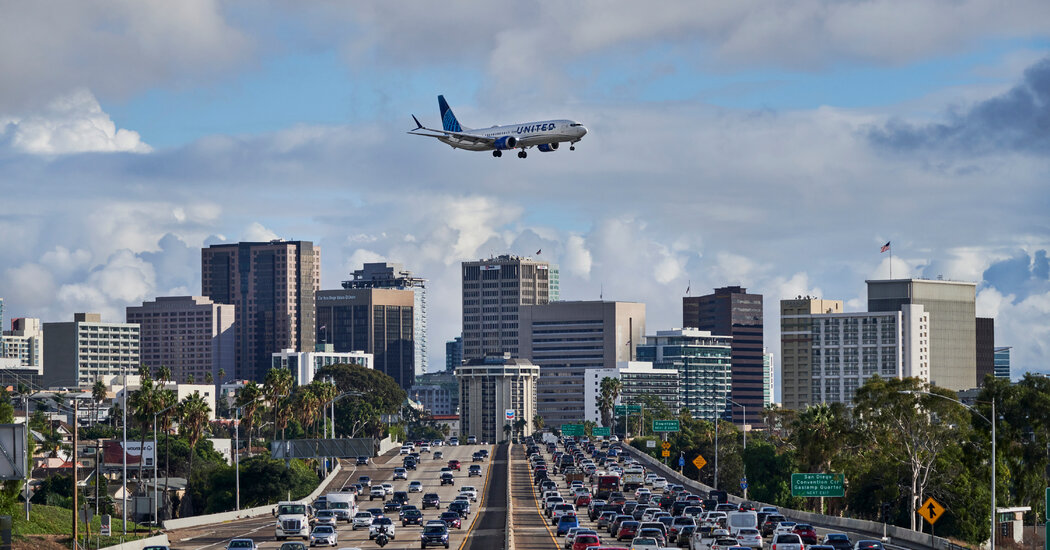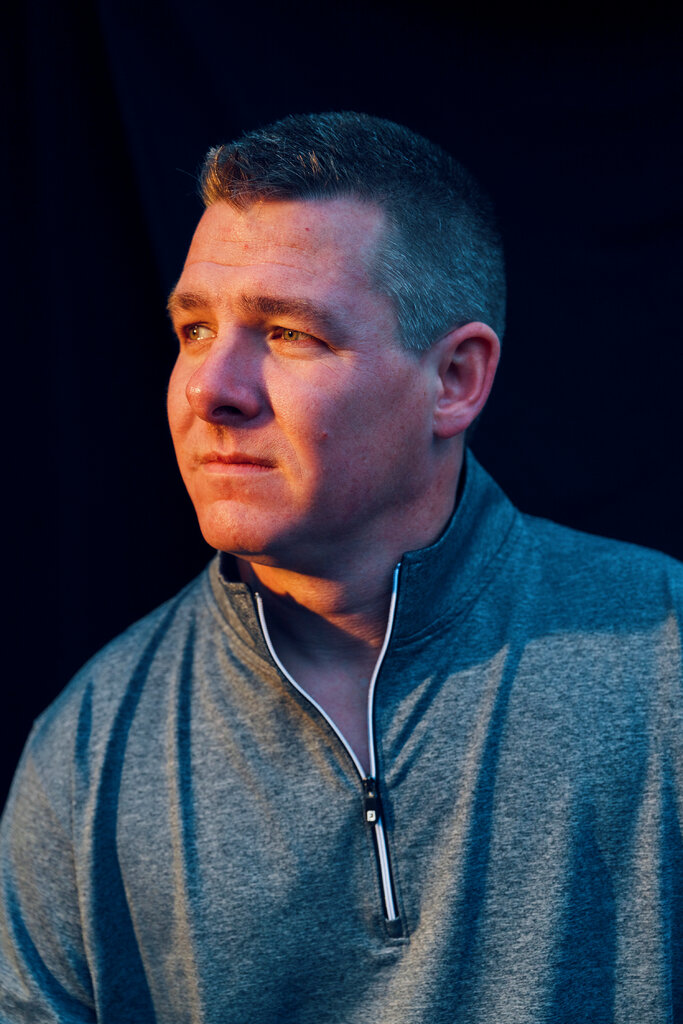Can't get past the paywall
Dec. 2, 2023Updated 7:56 a.m. ET
One air traffic controller went into work drunk this summer and joked about “making big money buzzed.” Another routinely smoked marijuana during breaks. A third employee threatened violence and then “aggressively pushed” a colleague who was directing airplanes.
The incidents were extreme examples, but they fit into a pattern that reveals glaring vulnerabilities in one of the most important protective layers of the nation’s vaunted aviation safety system.
In the past two years, air traffic controllers and others have submitted hundreds of complaints to a Federal Aviation Administration hotline describing issues like dangerous staffing shortages, mental health problems and deteriorating buildings, some infested by bugs and black mold.
There were at least seven reports of controllers sleeping when they were on duty and five about employees working while under the influence of alcohol or drugs. The New York Times obtained summaries of the complaints through an open-records request.
Air traffic controllers, who spend hours a day glued to monitors or scanning the skies with the lives of thousands of passengers at stake, are a last line of defense against crashes. The job comes with high stakes and intense pressure, even in the best of conditions.
Yet the conditions for many controllers are far from ideal. A nationwide staffing shortage — caused by years of employee turnover and tight budgets, among other factors — has forced many controllers to work six-day weeks and 10-hour days.
The result is a fatigued, distracted and demoralized work force that is increasingly prone to making mistakes, according to a Times investigation. The findings are based on interviews with more than 70 current and former air traffic controllers, pilots and federal officials, as well as thousands of pages of federal safety reports and internal F.A.A. records that The Times obtained.
While the U.S. airspace is remarkably safe, potentially dangerous close calls have been happening, on average, multiple times a week this year,
The Times reported in August. Some controllers say they fear that a deadly crash is inevitable.
In the fiscal year that ended Sept. 30, there were 503 air traffic control lapses that the F.A.A. preliminarily categorized as “significant,” 65 percent more than in the prior year, according to internal agency reports reviewed by The Times. During that period, air traffic increased about 4 percent.
A
database of aviation safety issues is peppered with recent mistakes by exhausted controllers. A controller at the air traffic control center in the Jacksonville, Fla., area instructed one airliner to turn into the path of another, later blaming being overworked and fatigued. A controller at a facility that monitors the skies above Southern California told a plane to fly too low, attributing the lapse to being “extremely tired” after working “continuous” overtime.
“If I can make a small mistake like that, I can make a bigger one,” the controller wrote in a submission included in the database, which is maintained by NASA.
Many controllers are aviation enthusiasts who are drawn to the job because it can pay six figures. Some relish the opportunity to earn more by working overtime.
But The Times found that the combination of six-day workweeks and round-the-clock schedules has caused controllers to develop physical and mental health problems. Many avoid seeking professional help because doing so might jeopardize the medical clearances they need to work. Some turn to sleeping pills or alcohol to cope.
Others resign or retire. One was Ashley Smith, a longtime controller in Atlanta who said she had witnessed her overworked colleagues engaging in physical fights and making dangerous errors.
The F.A.A. estimated that more than 1,400
controllers— or about 10 percent of the total work force — would depart this fiscal year.
Video
Neil Burke, who worked as a controller in the New York metropolitan area, witnessed numerous mistakes by overly tired controllers.CreditCredit...Photographs and Video by Mohamed Sadek
Neil Burke worked as a controller for more than a decade, including at the facility that directs air traffic in and out of airports in the New York metropolitan area. It is widely regarded as one of the country’s most complex control rooms. For years, controllers there have worked six days a week and 10-hour days. Mr. Burke, who left the F.A.A. last year because of a medical issue, said he had caught himself and other overly tired controllers making mistakes.
“What happens when you stretch a rubber band too much?” Mr. Burke asked. “It breaks.”
Jeannie Shiffer, an F.A.A. spokeswoman, said the agency “maintains the safest, most complex and busiest airspace in the world.” She added, “The nation absolutely needs more air traffic controllers, and growing the work force will result in better working conditions and more flexibility.”
Ever since the Reagan administration replaced thousands of striking controllers, the agency has struggled to keep pace with waves of retirements. The problem grew worse during the Covid-19 pandemic, when the F.A.A. slowed training of new controllers.
For the current fiscal year, the F.A.A. sought $117 million to train controllers and hire 1,800 new ones.
Yet training is difficult; many aspiring controllers fail. The F.A.A.’s hiring plan is expected to have “a negligible improvement over today’s understaffed levels,” with a net increase of fewer than 200 controllers by 2032, the National Airspace System Safety Review Team, a group of experts appointed by the agency, said in
a November report.
Swarmed by Insects
From 2011 to 2022, the number of fully certified controllers declined more than 9 percent, even though traffic increased. Based on targets set by the F.A.A. and the union representing controllers, 99 percent of the nation’s air traffic control sites are understaffed. (Under a looser standard that the agency prefers, Ms. Shiffer said, 63 percent of facilities are considered inadequately staffed.)
To help fill that gap, controllers at 40 percent of the facilities worked six-day weeks at least once a month last year, according to the controllers’ union. Several locations required controllers to do so every week.
The number of overtime hours clocked by controllers nearly tripled over the past decade, according to F.A.A. data.
A chart showing that from 2011 to 2022, the number of air traffic controllers fell by 9.1 percent.

Percent change in the number of air traffic
controllers since 2011
+2% change from 2011
–2%
–4
–6
–8
–10
–12
’12
’14
’16
’18
’20
’22
(FISCAL YEAR)
In interviews as well as safety complaints to the F.A.A. and NASA, controllers reported deteriorating workplace conditions. Elevator malfunctions forced employees to climb hundreds of stairs to reach the towers. Bees and biting flies harassed controllers who were directing traffic. Faulty air-conditioners left control rooms alternately broiling or freezing. One employee at a facility in Texas had to take in lightbulbs from home.
“The age and condition of F.A.A. facilities and equipment are elevating system risk to unsustainable levels,” the National Airspace System Safety Review Team wrote in its November report.
Controllers said the unrelenting schedules and unpleasant working conditions left them wiped out.
“These are humans,” said Michelle Hager, who retired in June after 26 years as a controller. “They get tired, and they make mistakes.”
Ms. Hager, who spent most of her career in Denver, had the option to work six more years before reaching the mandatory retirement age of 56. But the schedule had become “not only exhausting but depressing.”
“There is no time to mentally recover away from the required work,” she added. “I couldn’t continue to live like that.”
Video
Michelle Hager, who retired in June after 26 years as a controller, said the schedule had become “not only exhausting but depressing.”CreditCredit...Photographs and Video by Mohamed Sadek
Ten Cups of Coffee
In a series of interviews this year, a controller in the Northeastern United States explained how the job was affecting his life. (The Times agreed to not publish his name because he feared professional repercussions.)
The controller worked in a dark radar room, radioing commands to pilots and monitoring a screen with moving dots that represented planes flying across the region. He had occasional breaks, often less than half an hour, in which he had to eat, refill his water bottle, go to the bathroom and complete other work before returning to his position.
On Thursdays and Fridays, his shifts typically began in the afternoon. For the rest of his workweek, they began earlier: 8 a.m. on Saturdays and 6:30 a.m. on Sundays, followed by a 10:30 p.m. shift that ended around dawn on Mondays. Only eight or nine hours separated the end of some shifts from the beginning of others.
He was supposed to have Tuesdays and Wednesdays off, but he was almost always called in for overtime on one of those days. “So much for a two-day weekend,” he said this summer, on what was supposed to be a day off. “I just got scheduled a 2 p.m. to 10 p.m. shift today.”
During the first part of his workweek, he tried to get to sleep by 2 a.m. Later in the week, he went to bed at 7:30 p.m. to prepare for his 4 a.m. alarm.
Despite being exhausted, he often found it impossible to sleep. He eventually went to a doctor, who diagnosed him with sleep apnea and told him to quit his job because the schedule was endangering his health.
Quitting wasn’t realistic. As his family’s breadwinner, he couldn’t afford to give up the pay and generous pension. Plus, he loved controlling planes. It was the overtime that made the job intolerable, even though the extra hours added 25 percent to his roughly $150,000 salary.
To fall asleep, he sometimes took over-the-counter sleeping pills. (He didn’t report this to the F.A.A., which bars controllers from working soon after taking medications that cause drowsiness.) To stay alert, he relied on energy drinks and coffee.
He routinely showed up to work groggy and found himself unable to recall words during conversations. Sometimes he was so tired and hopped up on caffeine — he calculated one day that he had consumed the equivalent of 10 cups of coffee by noon — that he felt he might vomit. Other times, he caught himself nodding off on the overnight shift.
After more than 10 years in the job, he recently made what he considered his first big mistake, nearly allowing two jets to get too close together. There was no collision. He wondered if he would be so lucky the next time.
Panic Attacks at Work
The Jacksonville air traffic control center is one of the country’s busiest, directing planes
over parts of Florida, Georgia, Alabama and the Carolinas. Yet it has only 207 controllers, below the target of 298 set by the F.A.A. and the controllers’ union.
The toll on safety has become apparent.
There was the close call caused by the fatigued controller, which occurred in April. And in a confidential safety report last year, a Jacksonville controller described hyperventilating and struggling to stand after two hours of directing heavy plane traffic.
“We have recently had a heart attack, multiple panic attacks (including my own), people losing their medicals due to depression and some that just outright quit the F.A.A. because it has gotten so bad,” the controller wrote. “Who knows how many other stress-induced physical and mental issues are happening that we don’t even know about yet,” the controller added. “This place is breaking people. We need help. I’ll say it again, SOS!!”
At a Senate hearing in November, Jennifer L. Homendy, the chairwoman of the National Transportation Safety Board, said the shortage of air traffic controllers, coupled with mandatory overtime, had become a threat to aviation safety.
“We are putting the psychological stress of the entire aviation safety system on the shoulders of our A.T.C. work force,” she
testified, referring to air traffic controllers, “and this is unacceptable.”
In interviews and complaints submitted to the F.A.A., air traffic employees warned that they and their colleagues were buckling. (Names and locations were redacted from the complaint summaries provided to The Times.)
- One complaint described a controller “caught sleeping on operational positions numerous times.” Another described two controllers falling asleep “while providing air traffic services.”
- An employee “physically assaulted one controller, verbally assaulted another controller,” who began to cry, and then shoved a chair at someone. Other hotline reports also detailed physical and verbal attacks.
- Several controllers reported that co-workers appeared unstable, with one “showing extreme signs of mental problems.”
- Controllers in one location were reported for “using alcohol and illegal drugs while on position” directing traffic. Another described the “strong odor of alcohol” on multiple air traffic employees.
- One controller who worked in Colorado and elsewhere said she consumed up to nine vodka drinks a night to deal with trouble sleeping and recurrent panic attacks that her doctor attributed, in part, to her job.
Ms. Shiffer, the F.A.A. spokeswoman, said the agency investigates all hotline complaints and acts on credible ones.
Controllers said they had been reluctant to seek help for physical and mental health problems because of the F.A.A.’s rules requiring medical clearances.
The guidelines, which are designed to ensure that controllers are mentally and physically sound, prohibit them from taking certain medications that can cause drowsiness or other side effects. The rules also disqualify controllers with certain medical conditions from working.
One unintended consequence, numerous controllers said, is that they avoid taking necessary medications or resort to alcohol or drugs.
Ms. Shiffer said the agency took controllers’ health seriously, including by offering free counseling. “When they have issues, we work with them to resolve it,” she said.
It is not only controllers confronting this dilemma. In October, an off-duty pilot in the cockpit of an Alaska Airlines flight tried to shut off the plane’s engines after consuming psychedelic mushrooms. He said he had been
struggling with his mental health for years but avoided medication, fearing he would be grounded. He was charged with 83 counts of attempted murder and pleaded not guilty.
Image
San Diego International Airport is one of hundreds of locations with a shortage of air traffic controllers.Credit...John Francis Peters for The New York Times
Alarms in the Control Tower
A series of recent close calls in San Diego show how the combination of overworked controllers and thin staffing can create dangerous situations.
In August, an air traffic controller cleared a private plane to land on the same runway from which a Southwest Airlines flight was preparing to depart. As the Cessna jet descended, another plane distracted the controller. She noticed the potential crash only at the last minute.
Collision alarms sounded in the control tower, and she ordered the Cessna to abort its landing. It came
less than 50 feet from crashing on top of the Southwest plane.
The controller later confided to a colleague that she had been fatigued at the time and lost focus, the colleague said in an interview. The controller’s supervisor had been dealing with a jammed printer, according to an internal F.A.A. safety report reviewed by The Times.
The close call was one of at least seven in San Diego over the past two years, according to F.A.A. records and the NASA database.
Those followed two serious incidents in May and June 2021 that involved Southwest, Delta Air Lines and SkyWest Airlines flights. In response, the F.A.A. sent investigators to San Diego. Controllers reported feeling “rusty” and distracted, according to the
agency’s subsequent report, which also cited staffing issues.
There have been more problems since.
In March, an airline pilot said he had nearly collided with a corporate jet while taxiing in San Diego after a controller failed to warn him about the other plane, according to a report in the NASA database.
In June, a controller died by suicide. Another soon quit. In October, a controller was directing planes when she experienced chest pain and trouble breathing. An ambulance rushed her to a hospital. She hasn’t been back to work since, according to a controller.
The F.A.A. said 21 fully trained controllers were assigned to San Diego. The targets set by the F.A.A. and the controllers’ union call for 28.
Video
Ashley Smith, a longtime controller in Atlanta, saw her overworked colleagues have physical fights and make mistakes.CreditCredit...Photographs and Video by Mohamed Sadek
‘Kicking the Can’
Ashley Smith had worked for more than a decade as a controller in the Atlanta area, where she monitored radar and directed planes from inside a dark room.
Last year, there were 77 fully certified controllers at Ms. Smith’s location, below the target of 110.
Morale deteriorated. Embittered controllers shouted at one another and sometimes had physical fights, she said. Between the perpetual overtime and three young children at home, Ms. Smith felt that she was in a constant daze.
She said she had witnessed an increase in mistakes by fatigued controllers. She found the pattern especially unnerving because her husband was an airline pilot.
In January 2022, an error by a controller in Atlanta caused two Delta airliners to get dangerously close, according to internal F.A.A. safety reports. A cockpit collision alert prompted one plane’s pilots to quickly climb. In a review, the F.A.A. acknowledged that fatigue might have been a factor, given that the controller’s schedule had included two overtime shifts in each of the previous three weeks.
A few weeks after the close call, Ms. Smith sent an email to Tim Arel, a senior F.A.A. air traffic official. She detailed how multiple recent near misses in Atlanta had involved controllers who had repeatedly pulled overtime shifts.
“The staffing is ridiculous and getting worse,” she wrote. “What level of fatigue is the agency trying to get this work force to before they recognize a serious safety issue?”
Mr. Arel responded the next day, acknowledging that the agency faced staffing issues.
Three months later, Ms. Smith resigned, convinced that nothing would ever improve.
“They are kicking the can down the road,” she said.
Kirsten Noyes contributed research.





www.nytimes.com

